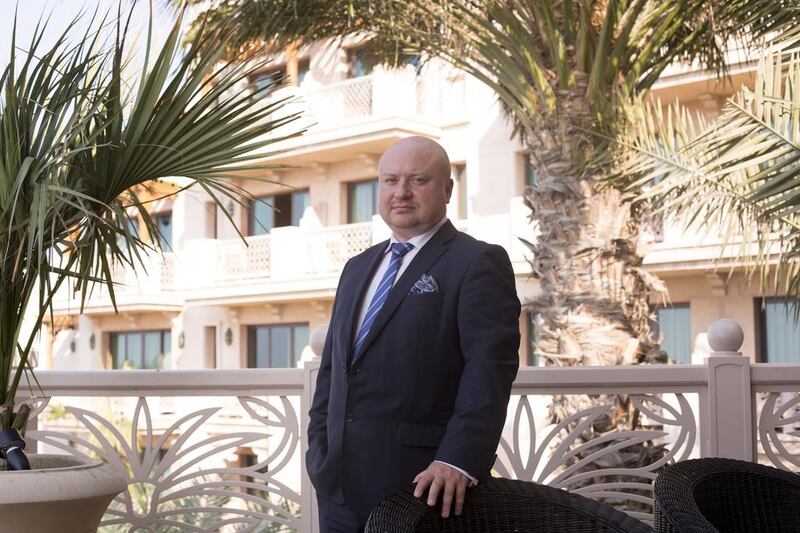Christmas decorations are being taken down and stored away across the western world, but they are still up in the sumptuous lobby of the Al Qasr hotel in Madinat Jumeirah. They are waiting for the Russians.
Dubai’s hotel executives, airline and tourism operators, real estate developers and bankers are waiting too, as is anybody in the UAE who has done lucrative business with oil-rich Russians over the past decade. The big question is: will they come this year?
Igor Egorov stops in the lobby and listens. “Hear those voices? There are still plenty of Russians coming here, this place is an old favourite. The holiday is nearly upon us, and Dubai is a ‘love destination’ for Russians. No other city is as well connected to Russia,” he says.
But Mr Egorov, an articulate Muscovite with a doctorate in economics who runs the Dubai-based Russian Business Council (RBC), is under no illusion as to the blow that Russian business, tourism and investment in the UAE has suffered as a result of western-imposed sanctions and the dramatic fall in the oil price.
“Of course there has been a drop in tourists. We’ve talked to travel agents and tour operators, and we think it is 50 per cent down for the new year [which is later in Russia than the rest of the world]. It will be a bit less for the high end luxury visitors who come here,” he says with a glance around Al Qasr. “But for the middle market it will be a bad season. Russian travel agencies have gone bankrupt, and airlines have been affected by the lack of travellers and the falling rouble. It is not good for them,” he concludes.
He sees knock-on effects for the Dubai real estate market and financial system, with Russians already deterred by high property prices in the emirate and by pressure to keep their money at home.
It is a reversal of the traditional view of Russians in Dubai. Free-spending visitors with an eye for bling and brands are now more likely to be counting their expensive dirhams on trips to the emirate and, apart from the ultra-rich at the very top end, will probably come less frequently while the economic turbulence continues at home.
Who is to blame? Mr Egorov is a sophisticated cosmopolitan, having grown up in Germany where his father was a senior executive for the Russian news agency Novosti, and who speaks English, German and Arabic in addition to his native tongue.
He thinks the Ukrainian conflict can be resolved only through compromise, but his view of the cause of the crisis is unapologetically Russian.
“The situation in Ukraine is not a simple Russian-Ukrainian conflict, as the west likes to paint it. There are foreigners there fighting on both sides. It began seriously when Kiev tried to ban Russian language, schools and media,” he says.
On the role of the West, he sees the hand of America behind the conflict: “Western politicians, mainly Americans, played a role in bringing about a more extreme attitude by Ukrainians. It was more comfortable for them to think in a ‘cold war’ mentality.”
On US motives, he is scathing: “I believe the Americans were worried about the possibility of Russia getting closer to Europe. A free-trade zone running from Vladivostok to western Europe was against their strategic interests.”
On sanctions, he is cynical: “They are harmful to western Europe as much as to Russia. Germany is our largest trade partner, why would the Germans do something to hurt themselves? It was the Americans who initiated it, and they never had any intention of sitting down with Russia and talking about Ukraine.”
He also believes that the Russian economy was in decline before it was hit by the “perfect storm” of sanctions, the oil fall and by a failure to modernise quickly enough from Soviet days. But he loyally pays tribute to the record of Vladimir Putin, Russia’s president and effective ruler for the past 15 years, for infrastructure investment and anti-bureaucracy drives.
Mr Egorov set up the RBC in 2010 to look after the business interests of the estimated 100,000 native Russian speakers in Dubai, a non-profit organisation he runs as a sideline from his “day job” as a supply chain manager in the motor industry. He thinks western sanctions and economic problems at home will do nothing to lessen increasing ties between the UAE and Russia.
“Russia has always seen the Middle East and India as natural allies and partners. We’ve always had good relations in this part of the world and were never seen as colonisers.
“The relationship with the UAE is more recent, but there is a high level of trust and understanding between leaders in Russia and the UAE. The UAE economics minister, Sultan Al Mansouri, made three trips to Russia last year,” he says.
One area of greater potential cooperation is Islamic finance, in which Russia has shown only a limited interest so far but which could become an important source of capital. “Because of sanctions and the problems of finance, Russia could look at Islamic finance as an opportunity,” he says.
The “perfect storm” has undoubtedly blown the Russian economy off course, but Mr Egorov is confident of the country’s resilience: “For Russians living in Dubai, there has been a strong increase in patriotic feelings, which is understandable when you are under attack. But we’ll get out of this situation.”
And in the long run, he sees only one winner: “Putin will still be in office when western leaders are writing their memoirs.”
fkane@thenational.ae
Follow The National's Business section on Twitter





